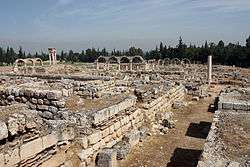Al-Abbas ibn al-Walid
| al-ʿAbbas ibn al-Walīd | |
|---|---|
| Died |
750 Harran |
| Allegiance |
|
| Years of service | ca. 707–720s |
| Relations | al-Walid I (father), Maslama ibn Abd al-Malik (uncle) |
Al-ʿAbbas ibn al-Walīd was an Umayyad Arab prince and general, the son of Caliph al-Walid I. A distinguished military leader in the Byzantine–Arab Wars of the early 8th century, especially in partnership with his uncle Maslama ibn Abd al-Malik, he became involved in the civil wars of the mid-740s and was imprisoned. He died in prison of an epidemic in 750.
Biography
Abbas was the son of Caliph al-Walid I (r. 705–715). Little is known about his early life, and Arab and Byzantine sources are often at odds concerning details of his career.[1] He first appears in the 707 campaign against the important Byzantine fortress of Tyana in Cappadocia, where he led the Arab army alongside his uncle Maslama ibn Abd al-Malik. The town withstood a long siege over the winter of 707–708, and surrendered only after a Byzantine relief army was defeated in spring. During the latter battle, Abbas is said by Arab chroniclers to have distinguished himself for the crucial role he played in stopping the wavering Arabs from fleeing and driving them on to victory.[1][2] According to Khalifa ibn Khayyat, he was appointed by his father as governor of the district of Homs.[3]
Abbas participated regularly in the almost annual expeditions launched into Byzantine Asia Minor during these years. His most notable campaigns were the capture of Sebaste in Cilicia in 712 and of Antioch in Pisidia in 713,[1][2] the raid into Paphlagonia in 721 where he is reported to have captured 20,000 prisoners, and a raid, placed in 722/723 but possibly reflecting an earlier campaign, that captured a fortress called Siza.[4] Meanwhile, in 720, along with his uncle Maslama, he led the suppression of the revolt of the governor of Iraq, Yazid ibn al-Muhallab.[1]
During the reign of the unpopular al-Walid II (r. 743–744), Abbas was initially reluctant to oppose the caliph and counselled against provoking a civil war. In the end, however, he participated in the conspiracy and coup that deposed Walid and brought Abbas' brother Yazid III on the throne.[1] Neither Yazid nor his successor Ibrahim I lasted long on the throne, which fell to the general Marwan ibn Muhammad (r. 744–750) during the ensuing civil war of the Third Fitna. Marwan had Abbas thrown into prison in Harran, where he died of a disease in 750.[1][2]
Founding of Anjar

While the establishment of the madina ("city") of Anjar (originally "Ayn al-Jarr") in the Beqaa Valley is normally attributed to al-Walid I, other sources, including the Byzantine chronicler Theophanes the Confessor and contemporary historian Jere L. Bacharach, credit Abbas for the city's founding in the fall of 714. Greek labourers from Asia Minor, who were likely captured by Abbas during his previous campaigns against the Byzantines, were utilized, in addition to Nestorian quarry workers and Coptic artisans. Bacharach states that construction halted during the winter and resumed in the spring of 715. A Friday mosque and an official residence (dar al-'imara) were built in Anjar. Its proximity to the ancient city of Baalbek made Anjar suitable to become an alternative administrative centre for the strategic Beqaa area, but following the death of al-Walid I in late 715 and Abbas' consequent falling out of favour with the new caliphs, Abbas' patronage of the city ended and further construction came to a permanent halt thereafter.[5]
References
- 1 2 3 4 5 6 Zetterstéen & Gabrieli 1986, pp. 12–13
- 1 2 3 Winkelmann et al. 1999, p. 4
- ↑ Crone 1980, p. 126.
- ↑ Blankinship 1994, p. 119
- ↑ Bacharach 1996, pp. 34–35
Sources
- Bacharach, Jere L. (1996). "Marwanid Umayyad Building Activities: Speculations on Patronage". In Necipoğlu, Gülru. Muqarnas: An Annual on the Visual Culture of the Islamic World. 13. Leiden: BRILL. pp. 27–44. ISBN 90-04-10633-2.
- Blankinship, Khalid Yahya (1994). The End of the Jihâd State: The Reign of Hishām ibn ʻAbd al-Malik and the Collapse of the Umayyads. Albany, NY: State University of New York Press. ISBN 978-0-7914-1827-7.
- Crone, Patricia (1980). Slaves on horses: the evolution of the Islamic polity. Cambridge and New York: Cambridge University Press. ISBN 0-521-52940-9.
- Winkelmann, Friedhelm; Lilie, Ralph-Johannes; Ludwig, Claudia; Pratsch, Thomas; Rochow, Ilse (1999). "al-'Abbas ibn al-Walīd (#5)". Prosopographie der mittelbyzantinischen Zeit: I. Abteilung (641–867), 1. Band: Aaron (#1) – Georgios (#2182) (in German). Berlin and New York: Walter de Gruyter. p. 4. ISBN 978-3-11-015179-4.
- Zetterstéen, K. V.; Gabrieli, F. (1986). "al-'Abbās b. al-Walīd". In Gibb, Hamilton Alexander Rosskeen. The Encyclopedia of Islam, New Edition, Volume I: A–B. Leiden and New York: Brill. pp. 12–13. ISBN 978-90-04-08114-7.